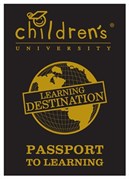Organisations
Children's University 'Learning Destinations' are what we call
places, events, organisations and activities which children can
decide independently to visit in order to take part in a recognised
learning activity.
All Learning Destinations have passed the Children's
University's own Quality Assurance (Validation)
process.
Learning Destinations can issue Learning Credits to the
children's "Passport to Learning" when they visit them and take
part in activities. Children collect the Learning Credits, which
build up to national certification levels of participation
that are presented at a Graduation ceremonies.
Earn Learning Credits at at whole host of Learning
Destinations!
Learning Destinations include museums and airports, exhibitions
and libraries, after-school sports and clubs. They provide high
quality learning activities and experiences with a 'wow' factor and
have passed the Children's University's own quality assurance
process (Planning for Learning). As long as the
Learning Destination has been Validated by the Children's
University it will have some publicity with the official logo, and
a stamp with which to credit a child's Passport to Learning.
Validated Learning Destinations will use the Passport to
Learning image to show that it has been Quality Assured by the
local or national Children's Unviersity:

Learning Destinations across the country are added to the National Children's University
website.
If you would like to recommend a potential Learning Destination,
please complete this Recommendation
Form and return it to us! It helps us to broker
introductions with new organisations.
How do I become a Learning Destination?
If your organisation can offer a potential learning opportunity
for the Children's University, please contact Kent Children's
University in the first instance.
